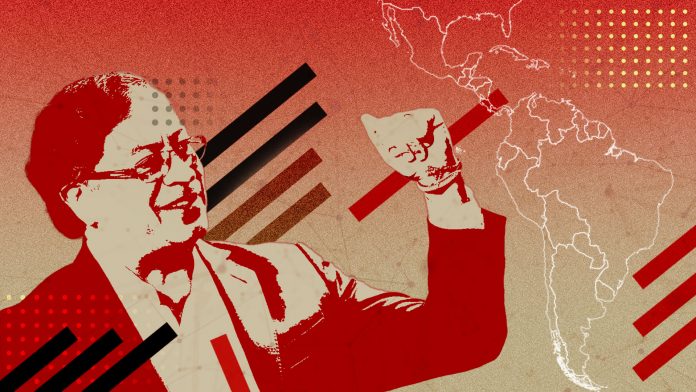
Ten countries and 51% of Latin Americans (i.e., 345 million people) will be ruled by leftist governments once Gustavo Petro becomes President of Colombia. And if Lula is elected again in Brazil in October, 212 million people should be added to that number. But this does not necessarily entail a common front in the continent. This is due to the different tenor of left-wing styles: progressive, populist and authoritarian (such as in the case of Venezuela, Nicaragua and Cuba).
Where does Petro fit in that spectrum? According to Colombian political scientist Sandra Borda, he is somewhere between Chilean President Gabriel Boric and Mexican President Andres Manuel Lopez Obrador. This means he has progressive hues, typical of the modern left that supports the vindication of historically displaced groups (such as communitites of indigenous people and people of native African origin), champions feminism and the fight against climate change. But he also has some shades of the old left of the 20th century, embodied by some members of his tightest circle. “He has one foot on each side,” Borda said to CONNECTAS.
Así queda el mapa de América Latina con la victoria de Petro.
La izquierda avanza mientras la derecha y el centro se desvanecen pic.twitter.com/xXD2K3Y1Py
— 💡Steph Henaro (@HenaroStephanie) June 20, 2022
Thus, his first months in office will be critical to know how he will relate to the press and civil society organizations that will be auditing him, for instance. And to confirm his choice of foreign policy.
In terms of the latter, he gave a glimpse of his stance in his celebratory address last Sunday night in front of thousands of his supporters in Bogota’s Movistar Arena. “We want Colombia to be at the forefront of the fight against climate change, this will be the priority of our diplomatic policy,” he said.
He also referred to the pursuit of a dialogue with the rest of the continent, including the United States, to move forward in energy transition, and he asked other countries in the area to “build themselves around agriculture and rural reforms, around agroindustrialization, of industries following new technologies.”
For Borda, a Senate candidate who ran for Nuevo Liberalismo (center) but who supported Petro in the runoff election, it was surprising to see the President-Elect’s emphasis on foreign issues, mostly because those topics were absent throughout the campaign. “It gives a feeling that the idea of articulating collective action in Latin America is inside Petro’s head, but I don’t believe we will see the return of the pink tide… he spoke of an articulation without exclusions, without pointing out the United States as the enemy.”
A few minutes after Petro’s victory was confirmed, presidents from the continent began congratulating him on social media. The most fervent obviously came from those on his ideological spectrum. Gabriel Boric wrote: “Joy for Latin America. We will work together for the union of our continent”. Lopez Obrador’s message, leaning towards a more traditional left-wing type, wrote a thread of three tweets in which he criticized Colombian conservatives, remembered the assasination of liberal leader Jorge Eliecer Gaitan in 1948, and claimed that Petro’s triumph could “be the dawn of our dignified and brother country.”
But one of the most commented messages in Colombian media came from Venezuelan President, Nicolas Maduro, who wrote: “The people’s voice has been heard, they defended the road of democracy and peace. New times await our brother country.”
Felicito a Gustavo Petro y a Francia Márquez, por la histórica victoria en las elecciones Presidenciales en Colombia. Se escuchó la voluntad del pueblo colombiano, que salió a defender el camino de la democracia y la Paz. Nuevos tiempos se avizoran para este hermano país. pic.twitter.com/FxodCn9Uqx
— Nicolás Maduro (@NicolasMaduro) June 19, 2022
It had been heralded that a change in government in Colombia would imply a diplomatic swerve with Venezuela, even if Petro’s contendent, Rodolfo Hernandez, had won; it is a fracture with current President Ivan Duque’s stance of confrontation and attempted cerco diplomatico (diplomatic fence) on Caracas’ government.
Oscar Arnal, a Venezuelan specialist on foreign affairs and former representative of the opposition, said to La Voz de América that he believes Petro understands the border’s complexity better. “He understands the relationship between Colombia and Venezuela as a former guerilla member, which is important. He understands the border very well and he knows what irregular groups mean,” he added.
Gabriel Pastor, an Uruguayan journalist and foreign affairs analyst, considers an approach with Maduro’s government to be feasible. “If you analyze what is happening in the region, and the case of the United States and Venezuela, Petro could play an interesting part. He could become an interlocutor for democratic elections in Venezuela but a pragmatic agenda with the United States is required to achieve that goal,” he said to CONNECTAS.
Pastor warns that, in the event of an approach with Venezuela, the topic of migration must be part of the agenda, and that Petro should extend Duque’s hospitality. Precisely, more than two million Venezuelans who migrated to Colombia escaping the ‘Bolivarian’ regime could exercise strong internal opposition to an approach with Maduro. In fact, according to Cynthia Arnson, an analyst of the Washington-based Wilson Center, “any sign of friendship between Petro y Maduro would be frowned upon by many sectors in Colombia”.
Petro, on his part, has said that he would continue with the Temporary Protection Status for Venezuelan Migrants, amidst criticism that point at the absence of this significant topic in his campaign.
All in all, Does Petro’s victory drift Latin America and the United States even farther? Historically, Colombia has been the great North American ally in the region, and Petro’s left-wing ideas consider that country to be the originator of many of Latin America’s evils.
From the United States, Secretary of State Antony Blinken offered kind words that made it clear that the northern country does not intend to strain the relationship: “We look forward to working with President-Elect Petro to further strengthen the U.S.-Colombia relationship and move our nations toward a better future.”
Congratulations to the Colombian people for exercising their right to vote and reaffirming the strength of their democracy. We look forward to continuing our strong partnership with President-Elect @petrogustavo and building a more democratic and equitable hemisphere.
— Secretary Antony Blinken (@SecBlinken) June 20, 2022
Gabriel Pastor, who is based in Washington but lived for a long time in Bogota, explains that “Colombia is a strategic ally for the United States in the area, but that relationship has been built with right-wing and center-right presidents. It is likely that Petro will distance himself from that affair and assume a colder stance. That is if he is willing to assume the cost it could bear on matters of safety and fight against drug trafficking.” For Pastor, Petro will likely take a pragmatic stance.
Sandra Borda concurs with this analysis. “I don’t think large and speedy revolutions will take place in the relationship with the United States. They (Petro’s team) are very concerned with sending a message of stability and continuity.”
The political scientist does think that Petro’s government will aim at different treatment, one that is more between equals. “It struck me that he wants climate change at the core of the conversations with the United States. That is interesting because the core has always been drug trafficking, a scenario in which we are to blame, we are the problem and the United States imposes ways to go about it. Pertaining to climate change it is the opposite, the United States and the developed countries are causing the problem.”
In time, will Gustavo Petro become another authoritarian and messianic leader as the ones that have recently risen to power in Latin America? Or will he be a progressive, pragmatic and moderate leader? It is too soon to tell. In his address on Sunday he delivered a message of unity to the country, he promised to “develop capitalism, not because we like it, but because first we need to overcome pre-modernity in Colombia” and he guaranteed that he would not affect private property nor try to overextend his four years in power, per the Constitution.
This effort to soothe those who voted against him was overshadowed when he, most unusually, asked the Attorney General to release radical young demonstrators of the recent social protests, a cause for concern to some who considered it a threat to judicial independence. Yet, Cynthia Arnson considers Colombian weight and counterweight institutions (such as the Congress and Constitutional Court) to be robust, a fact that could avoid possible Petrismo populism to gain momentum.
“Vamos a desarrollar el capitalismo en Colombia”: así fue el discurso del presidente electo de Colombia Gustavo Petro. Estos serán los ejes de su Gobierno https://t.co/ZWXyMUjLLH
— CNN en Español (@CNNEE) June 20, 2022
Only time will confirm if Colombia’s President-Elect indeed has an authoritarian inclination. Anyhow, analysts consulted maintain that foreign policy does not seem to be his priority, especially considering the country’s severe violence problems and the profound changes he aspires to undertake. Colombia, the most stable ally of the United States in Latin America throughout the years, has finally joined the subcontinent’s leftist wave. In this day and age, that must be a cause for concern to several in Washington.



